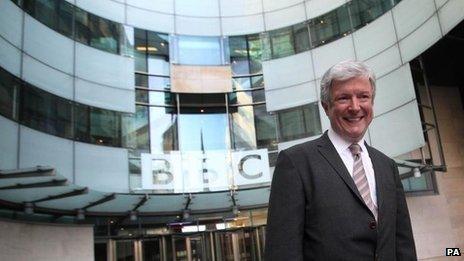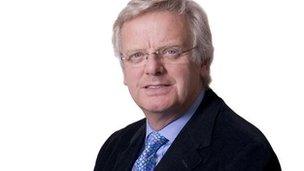BBC boss Tony Hall denounces calls to 'share' licence fee
- Published

BBC director general Lord Hall took over the corporation's top job last April
Tony Hall is to mount a defence of the BBC licence fee, rebuking critics who suggest it should be shared amongst other broadcasters.
In a speech in Oxford this week, the director general will say that "top-slicing" would place much-loved "content and services" at risk.
His comments will be seen a rebuke to former chairman Michael Grade, who wants BBC fees shared with Channel 4.
Lord Hall will argue those plans could destabilise the entire TV industry.
"In the anxiety to privatise the BBC, this proposal suggests nationalising the rest of the sector," he will tell the Oxford Media Convention on Wednesday.
"But, most importantly, the fragmentation of the licence fee risks de-stabilising a broadcasting model that works.
"A model that is based on competition for quality, but not funding, between public and private broadcasters."
The director general is stepping up his defence of the BBC's funding model as negotiations over the corporation's future intensify.
He has previously said he will be "more aggressive" and "less British" about arguing the case for the £145.50 licence fee, which comes up for renewal in 2016.
The BBC's Royal Charter, setting out the corporation's role, functions and structure, is also due for renewal after the general election.
The decision to freeze the licence fee during the last settlement negotiations in 2010 led to the BBC having to make savings that included 2,000 job losses.
Lord Hall will acknowledge on Wednesday that in the future, the BBC must demonstrate that any money it receives from the public is well spent.
Critics rebuffed
His speech comes after former BBC chairman Lord Grade suggested, external Channel 4 should "be put into competition with the BBC for a share of the licence fee".

Lord Grade also suggested the BBC should cut costs by merging BBC Two and BBC Four
Similar comments were made by the BBC's former Olympics chief Roger Mosey last year. He told The Times, external that allowing local radio stations to bid for BBC funds could "enrich the nation".
Meanwhile, Conservative party chairman Grant Shapps has claimed the licence fee could be cut, after a series of scandals that he says have damaged public trust in the BBC.
But Lord Hall is expected to rebuff those ideas in his speech, with a strongly-worded rebuttal to the BBC's critics.
"Instead of saying that the licence fee is so bad that no one should have it, they have begun to suggest that the licence fee is so good that everyone should have it. They say the licence fee should be competed for and allocated to a range of providers.
"What purpose would this serve? Would it make the BBC more responsive and accountable?" he will ask.
"Would contestable funding mean more choice for audiences? Audiences have never had a greater, richer amount of media choice.
"Top-slicing means just that - less and less funding for content and services that we know people love.
"And by weakening the BBC, you also weaken the competitive intensity that underpins the success of UK broadcasting."
In January, the corporation rejected calls to introduce a voluntary subscription fee - where users only pay for the services they want - warning it would exclude many who could not afford it.
- Published2 January 2014
- Published27 October 2013
- Published27 November 2013
- Published11 December 2013
- Published21 October 2013